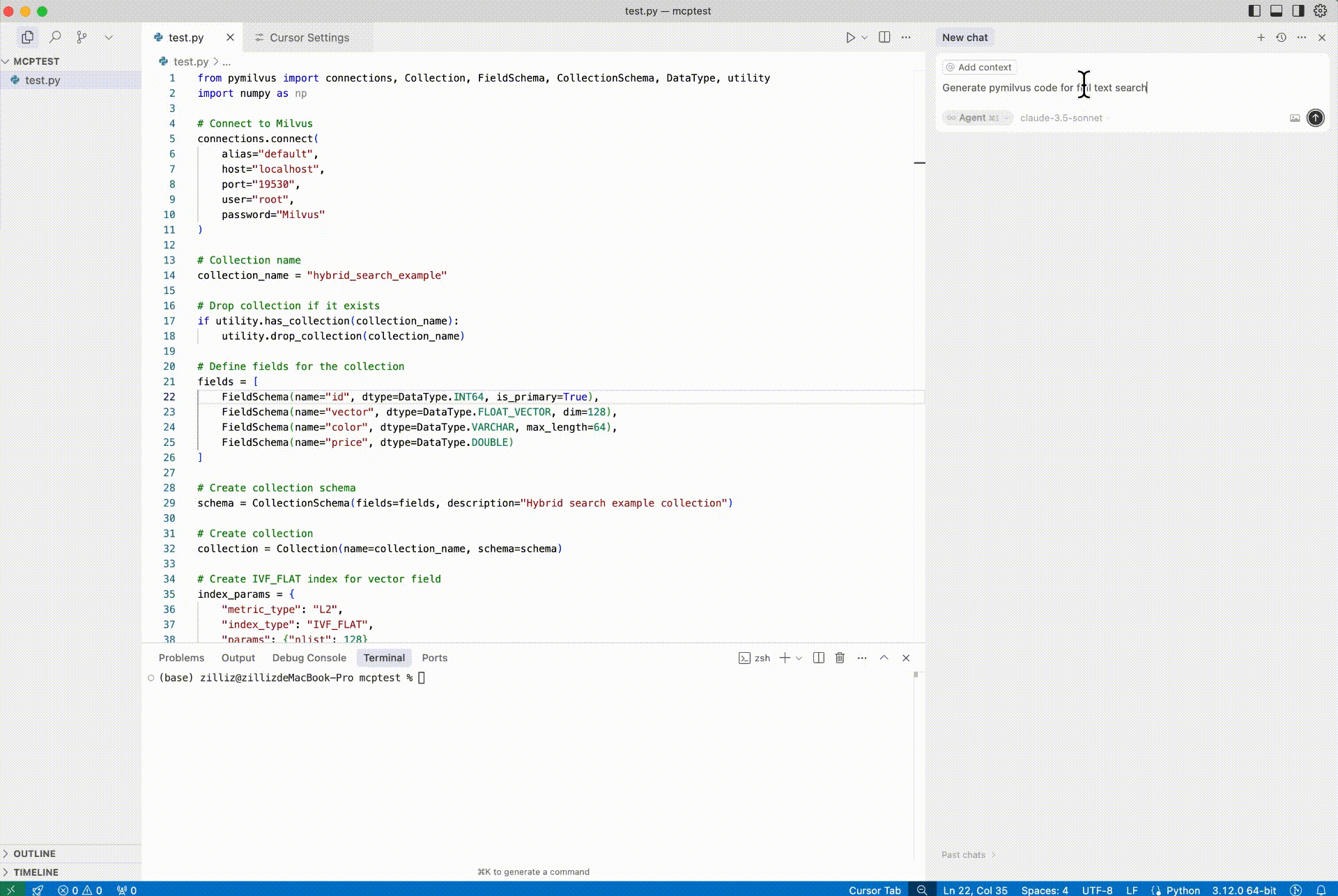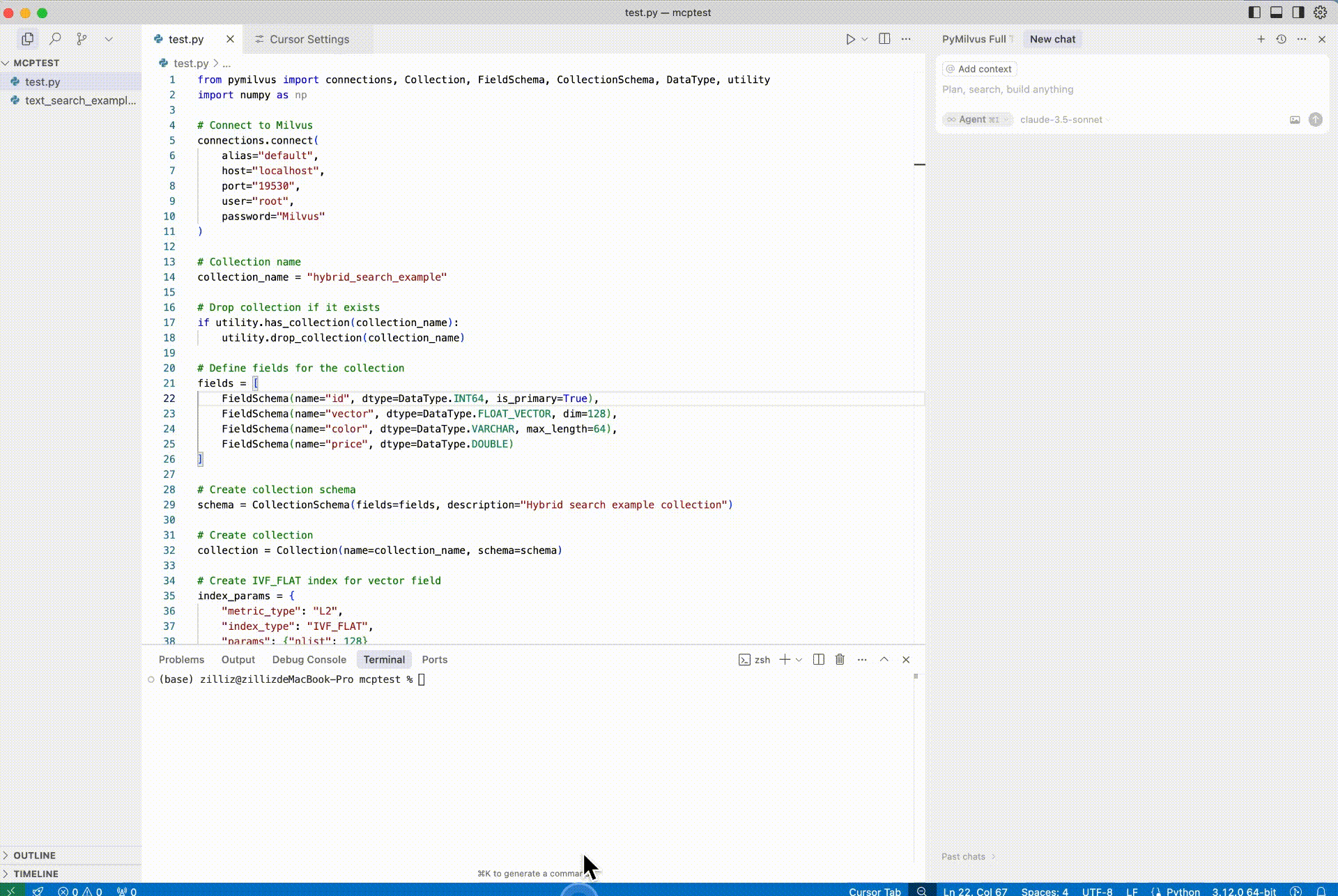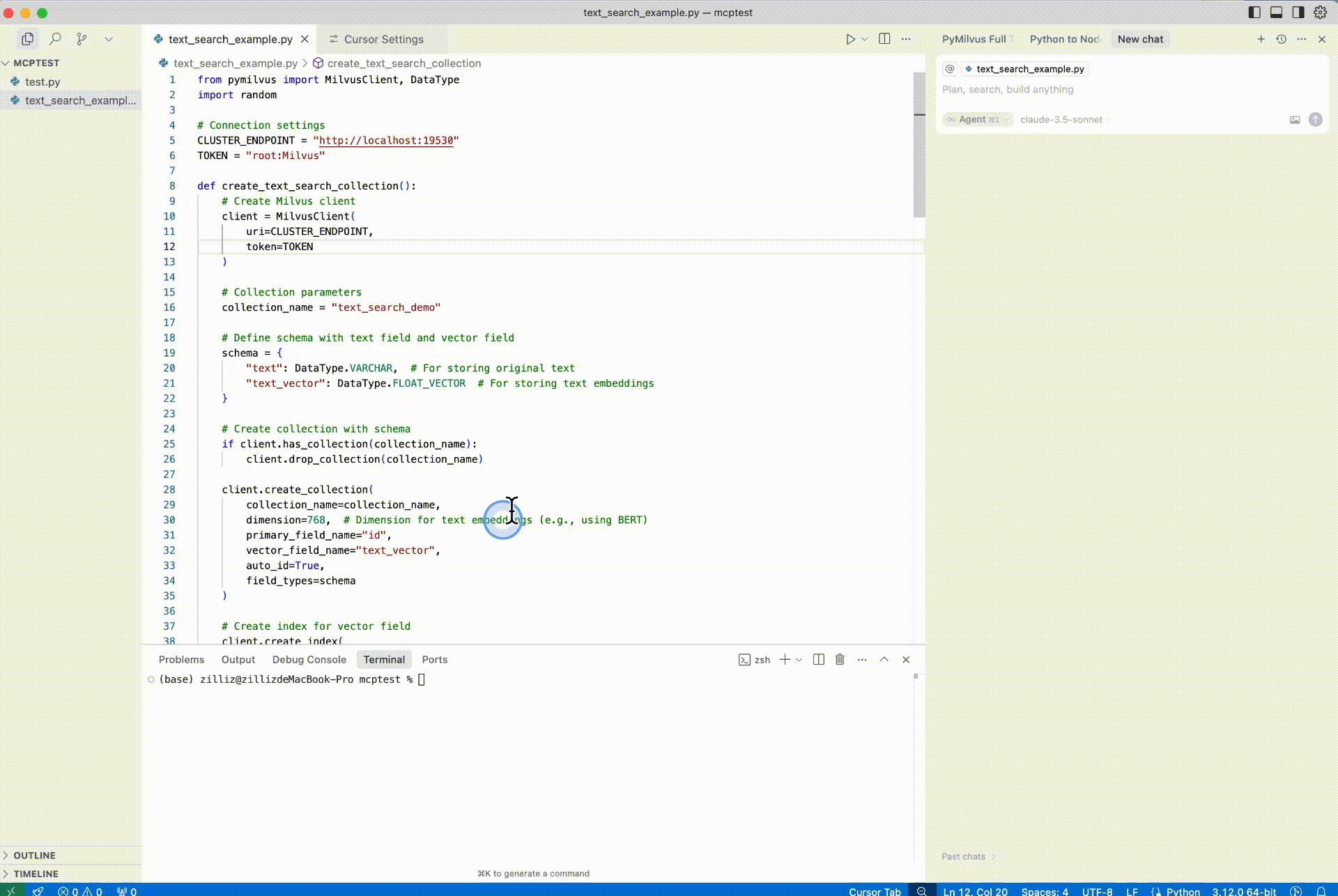- Explore MCP Servers
- mcp-pymilvus-code-generate-helper
Mcp Pymilvus Code Generate Helper
What is Mcp Pymilvus Code Generate Helper
mcp-pymilvus-code-generate-helper is a Model Context Protocol server designed to retrieve relevant code snippets or documents that assist in generating pymilvus code, utilizing SSE-based MCP support.
Use cases
Use cases include generating pymilvus code snippets for querying databases, assisting developers in integrating Milvus with their applications, and providing documentation support for pymilvus functionalities.
How to use
To use mcp-pymilvus-code-generate-helper, run the server using ‘uv’. You can choose between SSE and STDIO modes. For SSE, run ‘uv run src/mcp_pymilvus_code_generate_helper/sse_server.py’, and for STDIO, run ‘uv run src/mcp_pymilvus_code_generate_helper/stdio_server.py’. Configure the MCP server URL in your application settings accordingly.
Key features
Key features include support for both SSE and STDIO, easy integration with applications like Cursor and Claude Desktop, and the ability to connect to both local and remote Milvus instances.
Where to use
mcp-pymilvus-code-generate-helper can be used in various fields such as data science, machine learning, and software development, particularly where pymilvus code generation is needed.
Clients Supporting MCP
The following are the main client software that supports the Model Context Protocol. Click the link to visit the official website for more information.
Overview
What is Mcp Pymilvus Code Generate Helper
mcp-pymilvus-code-generate-helper is a Model Context Protocol server designed to retrieve relevant code snippets or documents that assist in generating pymilvus code, utilizing SSE-based MCP support.
Use cases
Use cases include generating pymilvus code snippets for querying databases, assisting developers in integrating Milvus with their applications, and providing documentation support for pymilvus functionalities.
How to use
To use mcp-pymilvus-code-generate-helper, run the server using ‘uv’. You can choose between SSE and STDIO modes. For SSE, run ‘uv run src/mcp_pymilvus_code_generate_helper/sse_server.py’, and for STDIO, run ‘uv run src/mcp_pymilvus_code_generate_helper/stdio_server.py’. Configure the MCP server URL in your application settings accordingly.
Key features
Key features include support for both SSE and STDIO, easy integration with applications like Cursor and Claude Desktop, and the ability to connect to both local and remote Milvus instances.
Where to use
mcp-pymilvus-code-generate-helper can be used in various fields such as data science, machine learning, and software development, particularly where pymilvus code generation is needed.
Clients Supporting MCP
The following are the main client software that supports the Model Context Protocol. Click the link to visit the official website for more information.
Content
mcp-pymilvus-code-generate-helper
A Model Context Protocol server that retrieves relevant code snippets or documents to help generating pymilvus code.


Prerequisites
Before using this MCP server, ensure you have:
- Python 3.10 or higher
- A running Milvus instance (local or remote)
- uv installed (recommended for running the server)
Usage
The recommended way to use this MCP server is to run it directly with uv without installation. This is how both Claude Desktop and Cursor are configured to use it in the examples below. The server now support both sse and stdio:
SSE
Running the Server
uv run src/mcp_pymilvus_code_generate_helper/sse_server.py
# mcp server will connect to local milvus server(http://localhost:19530) by default if no milvus_uri is provided
# to connect to a remote milvus server, you can specify the milvus_uri like this:
# uv run src/mcp_pymilvus_code_generate_helper/sse_server.py --milvus_uri http://<your-server-ip>:<your-server-port>
Usage with Cursor
- Go to
Cursor>Settings>MCP - Click on the
+ Add New Global MCP Serverbutton - Directly edit
mcp.jsonas below:
{
"mcpServers": {
"pymilvus-code-generate-helper": {
"url": "http://localhost:23333/milvus-code-helper/sse"
}
}
}Usage with Claude Desktop
⚠️ Claude desktop is currently limited in its ability to connect to remote MCP servers
STDIO
Running the Server
uv run src/mcp_pymilvus_code_generate_helper/stdio_server.py
# mcp server will connect to local milvus server(http://localhost:19530) by default if no milvus_uri is provided
# to connect to a remote milvus server, you can specify the milvus_uri like this:
# uv run src/mcp_pymilvus_code_generate_helper/stdio_server.py --milvus_uri http://<your-server-ip>:<your-server-port>
Usage with Cursor
- Go to
Cursor>Settings>MCP - Click on the
+ Add New Global MCP Serverbutton - Directly edit
mcp.jsonas below:
{
"mcpServers": {
"pymilvus-code-generate-helper": {
"command": "/PATH/TO/uv",
"args": [
"--directory",
"/path/to/mcp-pymilvus-code-generator",
"run",
"src/mcp_pymilvus_code_generate_helper/stdio_server.py",
"--milvus_uri",
"http://localhost:19530"
],
"env": {
"OPENAI_API_KEY": "YOUR OPENAI API KEY HERE"
}
}
}
}Usage with Claude Desktop
- Install Claude Desktop from https://claude.ai/download
- Open your Claude Desktop configuration:
- macOS:
~/Library/Application Support/Claude/claude_desktop_config.json
- macOS:
- Add the following configuration:
{
"mcpServers": {
"pymilvus-code-generate-helper": {
"command": "/PATH/TO/uv",
"args": [
"--directory",
"/path/to/mcp-server-milvus/src/mcp_server_milvus",
"run",
"src/mcp_pymilvus_code_generate_helper/stdio_server.py",
"--milvus_uri",
"http://localhost:19530"
],
"env": {
"OPENAI_API_KEY": "YOUR OPENAI API KEY HERE"
}
}
}
}- Restart Claude Desktop
⚠️ Note: Remember to set the OPENAI_API_KEY environment variable
User Rule
Here’s an additional instruction you can add for users to improve tool invocation accuracy in Cursor:
To ensure more accurate tool invocation when using Cursor, you can set a User Rule as follows:
Go to Cursor > Cursor Settings > Rules, and add the following to your User Rule. Here is an example user rule that has proven effective for your reference:
# !!!Always use tools for milvus code generation, conversion, and translation tasks **in the order of priority below**. #### 1. **Milvus Code Generation (Highest Priority)** - **Trigger**: - Request contains **`generate`** **OR** **`sample code`** **OR** **`how to write`** **AND** **`pymilvus`/`milvus`**. - **Exclude** requests with explicit language translation keywords (e.g., `to java`, `nodejs`). - **Action**: - Call `milvus_pypmilvus_code_generate_helper` with `query` = user's request. - **Example**: - "Generate pymilvus code for hybrid search" → **Must call this tool** - "Can you write a sample milvus code to list collections?" → **Must call this tool** #### 2. **Milvus Client ↔ ORM Code Conversion (Medium Priority)** - **Trigger**: - Request contains **`orm`** **AND** (`convert`/`translate`/`to client`/`to orm`). - **Exclude** requests with explicit programming language names (e.g., `java`, `python`). - **Action**: - Call `milvus_orm_client_code_convert_helper` with `query` = list of API calls (e.g., `["create_collection", "insert"]`). - **Example**: - "Translate ORM code to pymilvus client" → **Must call this tool** - "Convert client code to orm schema" → **Must call this tool** #### 3. **Milvus Code Translation Between Languages (Lowest Priority)** - **Trigger**: - Request contains **`translate to`** **AND** a **non-Python programming language** (e.g., `java`, `nodejs`, `go`). - **Must include** both `source_language` and `target_language` (e.g., "from python to java"). - **Action**: - Call `milvus_code_translate_helper` with: - `query` = list of API calls, - `source_language` = original language (default to `python` if not specified), - `target_language` = target language (e.g., `java`). - **Example**: - "Translate milvus code to java" → **Must call this tool** (assumes source is Python) - "Convert python code to nodejs" → **Must call this tool** #### **Critical Exclusion Rules** 1. **Do not call Tool 3 (`translation`) if**: - The request does not mention a **non-Python language** (e.g., only `pymilvus`/`python` is present). - Example: "Translate pymilvus code" → **Don't call Tool 3** (missing target language). 2. **Priority Enforcement**: - If a request matches **both Tool 1 and Tool 3** (e.g., "Generate code to java"), **force-trigger Tool 1** (code generation takes precedence over translation). 3. **Parameter Validation for Tool 3**: - If `target_language` is missing, **do not call Tool 3**; instead, use fallback to ask: *"Please specify the target programming language (e.g., 'to java' or 'to nodejs')"*. #### **Fallback Rule** - **When to Use**: - Request does not match any tool's trigger (e.g., "How does Milvus indexing work?"). - Tool 3 is triggered but missing `target_language`. - **Response**: *"Please clarify your request: 1. Code Generation (e.g., 'Generate pymilvus code for search') 2. ORM/Client Conversion (e.g., 'Convert orm to pymilvus') 3. Language Translation (e.g., 'Translate to java')"* If you meet the milvus code translation between different programming language task or convert between orm and milvus client, you must identify all API calls of the selected codes related to the Milvus SDK. The "query" argument should be a list of API call descriptions. Here is the examples: Example 1 Context: ``` from pymilvus import MilvusClient, DataType CLUSTER_ENDPOINT = "http://localhost:19530" TOKEN = "root:Milvus" # 1. Set up a Milvus client client = MilvusClient( uri=CLUSTER_ENDPOINT, token=TOKEN ) # 2. Create a collection in quick setup mode client.create_collection( collection_name="quick_setup", dimension=5 ) res = client.get_load_state( collection_name="quick_setup" ) print(res) ``` Parsed arguments of tool using: ["create_collection", "get_load_state"] Example 2 Context: ``` from pymilvus import MilvusClient client = MilvusClient(uri="http://localhost:19530", token="root:Milvus") if not client.has_collection("my_collection"): client.create_collection(collection_name="my_collection", dimension=128) client.insert( collection_name="my_collection", data=[{"vector": [0.1, 0.2, 0.3, 0.4, 0.5]}] ) client.flush(["my_collection"]) ``` Parsed arguments of tool using: ["has_collection", "create_collection", "insert", "flush"]
Feel free to adjust or add more rules as needed for your workflow.
Available Tools
The server provides the following tools:
-
milvus-pypmilvus-code-generator: Find related pymilvus code/documents to help generating code from user input in natural language- Parameters:
query: User query for generating code

- Parameters:
-
milvus-orm-client-code-convertor: Find related orm and pymilvus client code/documents to help converting orm code to pymilvus client (or vice versa)- Parameters:
query: A string of Milvus API names in list format from user query and code context to translate between orm and milvus client

- Parameters:
-
milvus-code-translator: Find related documents and code snippets in different programming languages for milvus code translation -
Parameters:
query: A string of Milvus API names in list format to translate from one programming language to another (e.g., [‘create_collection’, ‘insert’, ‘search’])source_language: Source programming language (e.g., ‘python’, ‘java’, ‘go’, ‘csharp’, ‘node’, ‘restful’)target_language: Target programming language (e.g., ‘python’, ‘java’, ‘go’, ‘csharp’, ‘node’, ‘restful’)

⚠️ Note: You don’t need to specify the tool name or parameters in the query. Just interact as you normally would when coding with LLM: state your requirements and select the relevant code context. MCP will automatically select the appropriate tool based on the query content and prepare corresponding parameters.
Docker
You can also build and run milvus code helper MCP server with Docker
Build the Docker Image
docker build -t milvus-code-helper .
Run the Docker Container
docker run -p <YOUR_HOST_IP>:<YOUR_HOST_PORT>:23333 -e OPENAI_API_KEY -e MILVUS_URI=<YOUR_MILVUS_URI> -e MILVUS_TOKEN=<YOUR_MILVUS_TOKEN> milvus-code-helper
Contribution
Contributions are welcome! If you have ideas for improving the retrieve result, please submit a pull request or open an issue.
License
This project is licensed under the MIT License.
Dev Tools Supporting MCP
The following are the main code editors that support the Model Context Protocol. Click the link to visit the official website for more information.










